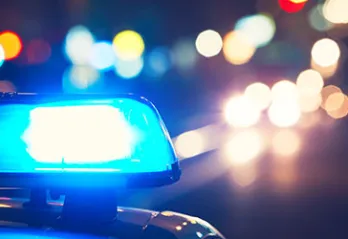CEO: In the Line of Fire

I was in an Uber a couple of weekends ago in downtown Denver and was chatting with the driver. Small-talk type of stuff. Of course the standard question is about the crazy things that have happened to her. We were her 1,800th trip; she was a pretty seasoned driver.
During all those trips, she said she only had two bad experiences, so 2 out of 1800 is 0.1%.
That seems to be a pretty good percentage, and I believe that it most likely represents the normal curve of trouble-makers who we all have to deal with on an average basis.
However, there is a group of us who work with this group of people more often: law enforcement, fire, EMS. Many of you know that I was a police officer for years in the Chicagoland area, and I know this to be a true statement. That group of public servants mainly deals with the fringe element of society.
Here is something written by police officer Jill Wragg that I would like for you to consider:
Confessions of a Police Officer
Dear Citizens, Neighbors, Friends and Family,
My name is Jill and I am a cop. That means that the pains and joys of my personal life are often muted by my work. I resent the intrusion but I confuse my self with my job almost as often as you do. The label "police officer" creates a false image of who I really am.
Sometimes I feel like I'm floating between two worlds. My work is not just protecting and serving. It's preserving that buffer that exists in the space between what you think the world is, and what the world really is.
My job isn't like television. The action is less frequent, and more graphic. It is not exhilarating to point a gun at someone. Pooled blood has a disgusting metallic smell and steams a little when the temperature drops. CPR isn't an instant miracle and it's no fun listening to an elderly grandmother's ribs break while I keep her heart beating. I'm not flattered by your curiosity about my work. I don't keep a record of which incident was the most frightening, or the strangest, or the bloodiest, or even the funniest. I don't tell you about my day because I don't want to share the images that haunt me.
But I do have some confessions to make:
Sometimes my stereo is too loud. Andrea Bocelli's voice makes it easier to forget the wasted body of the young man who died alone in a rented room because his family feared the stigma of AIDS. Beethoven's 9th symphony erases the sight of the nurses who sobbed as they scrubbed layers of dirt and slime from a neglected 2-year-old's skin. The Rolling Stones' angry beat assures me that it was ignorance that drove a young mother to draw blood when she bit her toddler on the cheek in an attempt to teach him not to bite.
Sometimes I set a bad example. I exceeded the speed limit on my way home from work because I had trouble shedding the adrenalin that kicked in when I discovered that the man I handcuffed during a drug raid was sitting on a loaded 9mm pistol.
Sometimes I seem rude. I was distracted and forgot to smile when you greeted me in the store because I was remembering the anguished, whispered confession of a teenager who pushed away his drowning brother to save his own life.
Sometimes I'm not as sympathetic as you'd like. I'm not concerned that your 15-year-old daughter is dating an 18-year-old because I just comforted the parents of a young man who slashed his own throat while they slept in the next bedroom. I was terse on the phone because I resented the burden of having to weigh the value of two lives when I was pointing my gun at an armed man who kept begging me to kill him. I laugh when you cringe away from the mess in your teen's room because I know the revulsion of feeling a heroin addict's blood trickling toward an open cut on my arm. If I was silent when you whined about your overbearing mother it's because I really wanted to tell you that I spoke to one of our high school friends today. I found her mother slumped behind the wheel of her car in a tightly closed garage. She had dressed in her best outfit before rolling down the windows and starting the engine.
On the other hand, if I seem totally oblivious to the blood on my uniform, or the names people call me, or the hateful editorials, it's because I am remembering the lessons my job has taught me.
I learned not to sweat the small stuff. Grape juice on the beige sofa and puppy pee on the oriental carpet don't faze me because I know what arterial bleeding and decaying bodies can do to one's decor.
I learned when to shut out the world and take a mental health day. I skipped your daughter's 4th birthday party because I was thinking about the six children under the age of 10 whose mother left them unattended to go out with a friend. When the 3-year-old offered the dog the milk from her cereal bowl, the dog attacked her, tearing open her head and staining the sandbox with blood. The little girl's siblings had to pry her head out of the dog's jaws — twice.
I learned that everyone has a lesson to teach me. Two mothers engaged in custody battles taught me not to judge a book by its cover. The teenage mother on welfare mustered the strength to refrain from crying in front of her worried child while the well-dressed, upper-class mother literally played tug of war with her toddler before running into traffic with the shrieking child in her arms.
I learned that nothing given from the heart is truly gone. A hug, a smile, a reassuring word, or an attentive ear can bring an injured or distraught person back to the surface, and help me refocus.
And I learned not to give up, ever! That split second of terror when I think I have finally engaged the one who is young enough and strong enough to take me down taught me that I have only one restriction: my own mortality.
One week in May has been set aside as Police Memorial Week, a time to remember those officers who didn't make it home after their shift. But why wait? Take a moment to tell an officer that you appreciate her work. Smile and say "Hi" when he's getting coffee. Bite your tongue when you start to tell a "bad cop" story. Better yet, find the time to tell a "good cop" story. The family at the next table may be a cop's family.
Nothing given from the heart is truly gone. It is kept in the hearts of the recipients. Give from the heart. Give something back to the officers who risk everything they have.
Jill Wragg is a retired Police Officer from Massachusetts. She can be reached at [email protected].
*** This essay is copyrighted. No reproduction or excerpting is permitted without written consent from Jill Wragg ([email protected]) ***
You may read this letter from Officer Jill and think that she is being melodramatic or over the top, that there is no way that all of this can happen to one police officer. You are absolutely, categorically wrong. We support our troops when they come home and realize the amount of trauma that is caused by the horror that they see.
Now think about veteran law enforcement/fire/EMS. How much have they seen and experienced?
If an emergency responder (law enforcement/fire/EMS) is in a rural area or smaller suburb, they will need to work for many years before they have the amount of trauma that Jill is describing. However, the service officers in a city or large town can easily experience this in a single year. Yes, you read that correctly. They can experience this in ONE YEAR.
In spite of this, we still expect public servants to act and react in a way that we each personally feel is correct every single moment of every single day. They have to make split-second decisions in an emergency that are then analyzed for the next two years. As a country, we have very high (if not impossibly high) expectations for this group of public servants.
I just want to remind everyone that horrible aberrations are outliers and do not represent the vast majority of our law enforcement/fire/EMS.
My point is that we are very quick to vilify our service officers for even the smallest action we don’t agree with (take for example, the rudeness or lack of sympathy Office Wragg describes in her essay). At times, it is because they have seen and experienced more than you can imagine. Yes, there are bad cops, but they are the 0.1% that we discussed earlier. The rest are ready to literally die for you.
So before you automatically condemn or judge, ask yourself a couple of questions:
1. Do I know the full story of what happened or am I just going by what the internet says?
2. Is how they are reacting actually inappropriate or unreasonable?
As a society we have entered into a cycle of not trusting our public servants and believing everything that is written in the paper, shown on TV or seen on the internet. My training Sergeant gave me advice that still resonates over 30 years later: There are eight sides to every story and you will only probably be able to ferret out four of them at the scene.
The rest you have to dig for.
Thank You,
Chris Coker
CEO/President of YMCA of Boulder Valley

